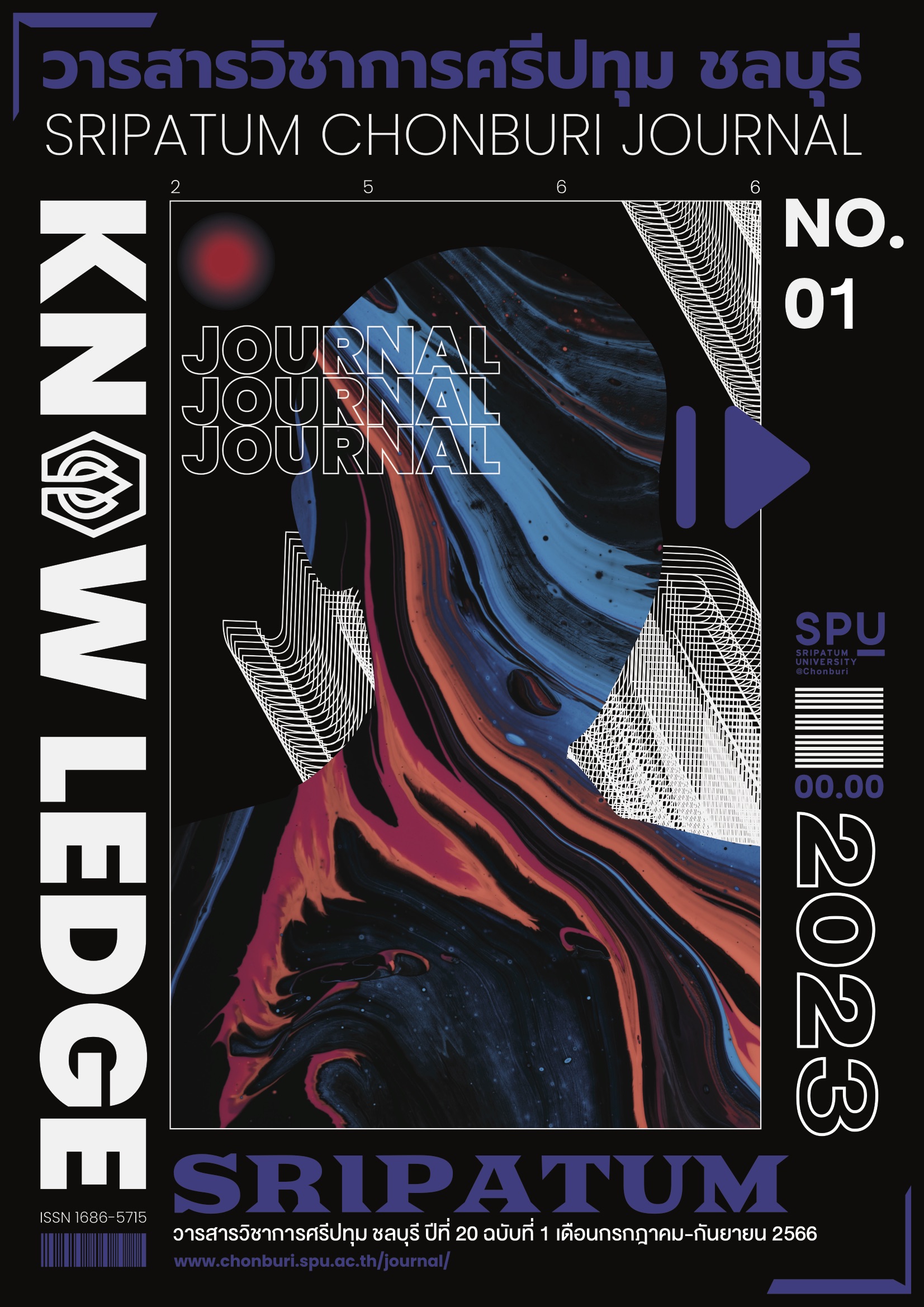THE TEACHERS ROLE ON LIFE SKILL DEVELOPMENT OF PRIMARY STUDENT LEVEL UNDER THE OFFICE OF THE BASIC EDUCATION COMMISSION IN CHONBURI PROVINCE
Keywords:
Teachers’ Role, Life Skill Development, Primary Student LevelAbstract
The purposes of this research were to 1) study the teachers’ role on life skill development of primary student level under the Office of the Basic Education Commission in Chonburi Province, 2) compare of those teachers’ role on life skill development with respect to gender, age, teaching experience at primary education level, number of students responsible for the room and the location of the school, and 3) examine the way to develop the role of those teachers. Quantitative research and interview were used to collect the data, which were then analyzed using a qualitative method. The research instruments included questionnaire. The samples, proportionately selected by stratified sampling method (Stratified Random Sampling), consisted of 370 primary teachers in Chonburi Province. In-depth interviews with 25 key informants were conducted. The research tools included a questionnaire with an index of Item Objective Congruence (IOC) at .97 and a reliability at .94 and the structured interview, the questions of which were reviewed and approved by 3 experts. Statistics used to analyze quantitative data included average, percentage, standard deviations, average comparison statistics, one-way variance analysis and qualitative data to triangulation data validation.
The results showed that: 1) The level of teachers’ roles in developing primary school student life skills of the Basic Education Commission in Chonburi Province was overall and by aspect at a high level. The highest level was the life skill development integrated with teaching and learning in the subject matter group, followed by roles in encouraging the learners to gain life skills based on 4 components and roles in organizing learning activities that promote student life skills by various techniques. 2) Teachers with different genders, ages, work experiences, number of students per class showed no difference in their roles in the students’ life skill development. However, the location of the school affected the role of teachers in the development of student life skills. Those working in the municipality area had more roles in developing student life skills than those working outside the municipality area. 3) Guidelines for the development of teachers’ roles in developing primary school students’ life skills under the Office of the Basic Education Commission in Chonburi Province included student-centered teaching; active learning activities, in which the students participated in activities or had as many practices as possible; class atmosphere enhancement; class anxiety reduction; and various role plays to have students express their opinions freely.
References
กระทรวงศึกษาธิการ. (2551). หลักสูตรการศึกษาขั้นพื้นฐาน พุทธศักราช 2551. กรุงเทพฯ: โรงพิมพ์ชุมนุมสหกรณ์การเกษตรแห่งประเทศไทย.
กระทรวงศึกษาธิการ. (2560). แผนการศึกษาแห่งชาติ พ.ศ.2560-2579. กรุงเทพฯ: โรงพิมพ์ชุมนุมสหกรณ์การเกษตรแห่งประเทศไทย.
ญาณัญฎา ศิรภัทร์ธาดา. (2553). รายงานการวิจัยการพัฒนาพฤติกรรมการเรียนและผลสัมฤทธิ์ ทางการเรียนของนักศึกษาในการเรียนวิชาหลักการตลาด
โดยการสอนแบบมีส่วนร่วม (Active Learning). กรุงเทพฯ: คณะวิทยาการจัดการ มหาวิทยาลัยราชภัฏสวนสุนันทา.
ดรุณี จันทร์แก้ว. (2553). การบริหารงานวิชาการแบบการมีส่วนร่วมของผู้บริหารโรงเรียนตามการรับรู้ของครูวิชาการสังกัดสำนักงานเขตพื้นที่การศึกษาประถมศึกษา
จังหวัดนราธิวาส. ปริญญาศึกษาศาสตรมหาบัณฑิต สาขาวิชาการบริหารการศึกษา, คณะศึกษาศาสตร์ มหาวิทยาลัยสงขลานครินทร์.
พิมพาพัญ ทองกิ่ง. (2563). บทบาทครูกับการจัดบรรยากาศชั้นเรียนเชิงบวกในศตวรรษที่ 21. ปริญญานิพนธ์หลักสูตรครุศาสตรมหาบัณฑิต สาขาวิชาหลักสูตร
และการสอน, คณะครุศาสตร์ มหาวิทยาลัยราชภัฏเชียงใหม่.
มหาวิทยาลัยเกษตรศาสตร์. (2565). รายงานการพัฒนาเด็กและเยาวชน ประจำปี 2564. กรุงเทพฯ: คณะสังคมศาสตร์ มหาวิทยาลัยเกษตรศาสตร์.
วศิน ชูชาติ. (2559). ความสามารถในการจัดการเรียนรู้ของครูเพื่อส่งเสริมทักษะการเรียนรู้ของผู้เรียนแห่งศตวรรษที่ 21 จังหวัดสุพรรณบุรี.
ปริญญาศึกษาศาสตรมหาบัณฑิต สาขาวิชาพัฒนศึกษา, คณะศึกษาศาสตร์ มหาวิทยาลัยศิลปากร.
วารุณี ลัภนโชคดี. (2560). ปัจจัยที่ส่งผลและพัฒนาการของระดับคุณภาพการศึกษาของสถานศึกษาขั้นพื้นฐานจากผลการประเมินคุณภาพภายนอก
ทั้งสามรอบของ สมศ. กรุงเทพฯ: สำนักงานรับรองมาตรฐานและประเมินคุณภาพการศึกษา (องค์กรมหาชน).
วิภาดา ศรีเจริญ. (2554). รายงานการวิจัยในชั้นเรียนผลการใช้รูปแบบการเรียนการสอนที่เน้นผู้เรียนเป็นสำคัญในรายวิชา วิทยาศาสตร์สุขภาพเบื้องต้น.
พิษณุโลก: คณะวิทยาศาสตร์และเทคโนโลยี มหาวิทยาลัยราชภัฏพิบูลสงคราม.
สุกันยา ลัทธิพรหม. (2546). บทบาทของครูและนักเรียนในการจัดการเรียนการสอนที่เน้นผู้เรียนเป็นสำคัญในโรงเรียนมัธยมศึกษา สังกัดกรมสามัญศึกษา
อำเภอร่อนพิบูล จังหวัดนครศรีธรรมราช. วิทยานิพนธ์ศิลปศาสตรมหาบัณฑิต สาขาสังคมศาสตร์เพื่อการพัฒนา, คณะมนุษยศาสตร์และสังคมศาสตร์
สถาบันราชภัฏนครศรีธรรมราช.
สำนักงานคณะกรรมการการศึกษาขั้นพื้นฐาน. (2554). การพัฒนาทักษะชีวิตในระบบการศึกษา ขั้นพื้นฐาน. กรุงเทพฯ: ชุมนุมสหกรณ์การเกษตร
แห่งประเทศไทย.
สำนักงานคณะกรรมการการศึกษาเอกชน. (2531). การบริหารโรงเรียนเอกชน. กรุงเทพฯ: สำนักงานคณะกรรมการการศึกษาเอกชน.
สำนักงานเลขาธิการคุรุสภา. (2556). พระราชบัญญัติสภาครูและบุคลากรทางการศึกษา พ.ศ.2546 (พิมพ์ครั้งที่ 6). กรุงเทพฯ: คุรุสภาลาดพร้าว.
สำนักงานเลขาธิการสภาการศึกษา. (2547). การประชุมวิชาการการวิจัยทางการบริหารการศึกษา. กรุงเทพฯ: โรงพิมพ์และทำปกเจริญผล.
สำนักงานศึกษาธิการจังหวัดชลบุรี. (2563). แผนพัฒนาการศึกษาจังหวัดชลบุรี พ.ศ.2561-2565. ชลบุรี: สำนักงานศึกษาธิการจังหวัดชลบุรี
สำนักวิชาการและมาตรฐานการศึกษา. (2554). แนวทางการพัฒนาทักษะชีวิตบูรณาการการเรียนการสอนใน 8 กลุ่มสาระการเรียนรู้. กรุงเทพฯ: โรงพิมพ์ชุมนุม
สหกรณ์การเกษตรแห่งประเทศไทย.
เสริมศรี ลักษณะศิริ. (2540). หลักการสอน. กรุงเทพฯ: คณะครุศาสตร์ วิทยาลัยครูสวนดุสิต.
Krejcie, V.R., & Morgan, W.D. (1970). Determining sample size for research activities. Educational and Psychological Measurement,
(3), pp. 607-610.
Downloads
Published
Issue
Section
License
Copyright (c) 2023 Sripatum Chonburi Academic Journal (Online)

This work is licensed under a Creative Commons Attribution-NonCommercial-NoDerivatives 4.0 International License.
บทความทุกบทความเป็นลิขสิทธิ์ของวารสารวิชาการศรีปทุม ชลบุรี



